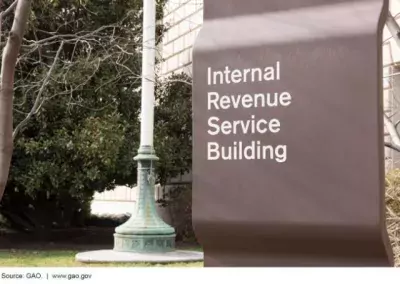How the Pandemic is Changing the IRS
At the onset of the pandemic, IRS had to temporarily shut down its onsite operations, including its mail processing facilities. The impact could be felt by taxpayers, who waited longer for returns to be processed or to receive COVID-related economic relief checks. But the pandemic also disrupted IRS’s tax enforcement programs used to check that information provided by taxpayers is verified, and that the correct amount of tax is paid to the federal government.
Today’s WatchBlog post looks at our new work on how IRS was impacted by COVID-19 in 2020 and 2021, as well as the long-term changes the pandemic may have on its operations.
Image

What happened to enforcement when IRS shut down in March of 2020?
To help protect the health and safety of IRS employees and the public, between March and July 2020, all in-person enforcement activities were halted, but so were mail-based activities because IRS mail processing centers were closed. Like many businesses at the start of the pandemic, IRS employees, who had begun teleworking, initially had limited ability to perform their tasks remotely. Some IRS employees—for example examiners from IRS’s Wage & Investment division—had not previously been allowed to telework. To adapt, IRS created a number of new procedures to enable a virtual workforce. IRS used technology, including video conferencing, to allow IRS staff to safely interact with taxpayers. For some audits, IRS staff met with taxpayers outdoors. E-fax technology and scanned documents also allowed taxpayers to send IRS documents, bypassing IRS’s closed facilities.
What about after IRS enforcement programs resumed?
Interruptions to mail, phone, and print operations continued to cause delays and backlogs in IRS’s enforcement caseloads even after operations resumed. Examiners experienced significant work backlogs along with new process challenges and reduced staff availability.
In July 2020, IRS decided to freeze sending new enforcement related notices to taxpayers so that it could catch up on processing older notices. As a result, some IRS notices were delayed until November 2020, and resulting casework pushed into 2021.
Enforcement caseloads increased from June 2020 to June 2021, but not all activities have returned to their prepandemic levels.
This year, IRS has been piloting an online text chat service allowing taxpayers to authenticate their identities, send documents, and settle specific account issues.
What has IRS learned from its pandemic operations?
Many enforcement activities across IRS were not telework ready because they largely relied on paper processes. IRS managers told us that IRS recognizes it needs to move from paper-based to more digital processes. Some of the new technologies and strategies that IRS used to manage enforcement activities during the pandemic may stick around.
IRS managers also told us that expanding self-help options for taxpayers has been a successful change to operations. Responding to challenges posed by the pandemic has demonstrated that virtual communication and digital processes can help in times of crisis, and IRS is currently assessing lessons learned for potential permanent improvements.
Our work about COVID-19’s impacts on IRS enforcement was part of our eighth comprehensive report on the federal response to the pandemic. To find out more, check out our full report.
- Comments on GAO’s WatchBlog? Contact blog@gao.gov.
GAO Contacts
Related Products

GAO's mission is to provide Congress with fact-based, nonpartisan information that can help improve federal government performance and ensure accountability for the benefit of the American people. GAO launched its WatchBlog in January, 2014, as part of its continuing effort to reach its audiences—Congress and the American people—where they are currently looking for information.
The blog format allows GAO to provide a little more context about its work than it can offer on its other social media platforms. Posts will tie GAO work to current events and the news; show how GAO’s work is affecting agencies or legislation; highlight reports, testimonies, and issue areas where GAO does work; and provide information about GAO itself, among other things.
Please send any feedback on GAO's WatchBlog to blog@gao.gov.




